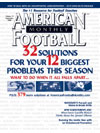AMERICAN FOOTBALL MONTHLY THE #1 RESOURCE FOR FOOTBALL COACHES
Article CategoriesAFM Magazine
|
Building Better BruinsPresented by: Muscle Milk© More from this issue Head Athletic Performance Coach Mike Linn of UCLA has come home. Raised in Southern California, Linn was a two-year starter for the Bruins on the offensive line and stayed with the program after graduation, eventually becoming UCLA’s Head Strength and Conditioning Coach from 1999 to 2002. For the last several years, he’s been training individual athletes and supervising training programs nationwide for Velocity Sports Performance, a leading provider of individual performance training programs. With his return to UCLA earlier this year, Linn has transformed the Bruin strength and conditioning program by restoring training table and adding advanced technology that enables him and his staff to create customized nutrition and training regimens for every individual Bruin athlete. AFM asked Linn about his return to UCLA and the evolution of modern performance training methods. AFM: What has it been like coming back to UCLA after being away for five years? Linn: One word sums it up – special. Any time you can come back and coach at your alma mater, it’s special, and when you can do it twice in your career, it’s extra special. What about college football and the team environment did you miss most? Seeing the end result. The years that I was in the private sector in the growing world of private training for athletes were great, but you don’t get a chance to see the final product. You work with individuals and see them blossom, but you don’t get to develop an actual team or be there on the sidelines in the fall to see the fruits of your labor. What are the challenges you’re facing at UCLA as they relate to strength and conditioning and what steps are you taking to address those challenges? Our challenge is the same challenge that every program has, and that’s putting a competitive product on the field. The role of the strength and conditioning program has changed, and today we not only have to train harder but we have to train smarter. Our athletes are faster, stronger and more explosive than they’ve ever been in the past and to be competitive you have to win in the off season. By the time camp starts, guys have to be in great shape. The big change we’re making here is taking a more holistic approach with our athletes. In the past, our department was known as “Speed, Strength and Conditioning,” and while those things are still very important, other things like flexibility, visual training and nutrition also play a big role in putting the best athletes on the field. Getting a solid nutrition program going has been key. At our training table athletes get exactly what they need to eat, when they need to eat it and they also get help with their recovery process. Since your playing days at UCLA 16 years ago, what are the most significant changes you’ve seen in athlete nutrition? Very simply, 16 years ago nobody had a very good understanding of what was the right thing to eat or the right time to eat it. Today, everyone knows and they’re doing a good job at it. Now, you have athletic departments that have full-time sports nutritionists that work closely with the strength and conditioning coaching staffs to design custom meal plans and make sure the athletes are getting exactly what they need. It’s night and day compared to what it used to be. What role do Muscle Milk Collegiate products play in your program? We feel strongly about getting the right nutrients into our athletes within that critical 30-minute window after they train. When our athletes finish their morning training session, before they leave the weight room, they’re consuming Muscle Milk Collegiate. They actually drink Muscle Milk Collegiate on the way to training table, where they eat their pre-planned meal. We’re certainly a big believer in Muscle Milk Collegiate – it helps our athletes recover and helps the athletes that need pure, quality calories get them. Do you customize how you use the products for individual athletes? Yes, that’s our philosophy here at UCLA. We purchased a Bod Pod, which is the body fat analysis machine that they use at the NFL Combine, and we have metabolic carts so we can get a resting metabolic rate on our athletes. So now we can dial in on how many calories that our athletes need and where those calories should be coming from – more proteins or more carbohydrates – and give them a customized Muscle Milk Collegiate and training table program based on exactly what they need. Can you sum up your philosophy for a successful football strength and conditioning program? The thing that we really emphasize with our athletes is we train movement, we don’t train weight. That sounds simple but it’s actually pretty complex, and it’s the basis for our entire methodology. In the old days, we would just put a ton of weight on the bar, and if the athlete was a little dysfunctional in his movement, that was OK. Now, it’s looking at athletes and understanding how they move and correcting them so they’re functional before you start adding weight onto that bar. We also make sure that everything is done explosively. We’re training fast, explosive athletes, so we try to hone in on those types of drills and exercises. For More Information: https://www.cytosport.com |
|
| HOME |
MAGAZINE |
SUBSCRIBE | ONLINE COLUMNISTS | COACHING VIDEOS |
Copyright 2025, AmericanFootballMonthly.com
All Rights Reserved




